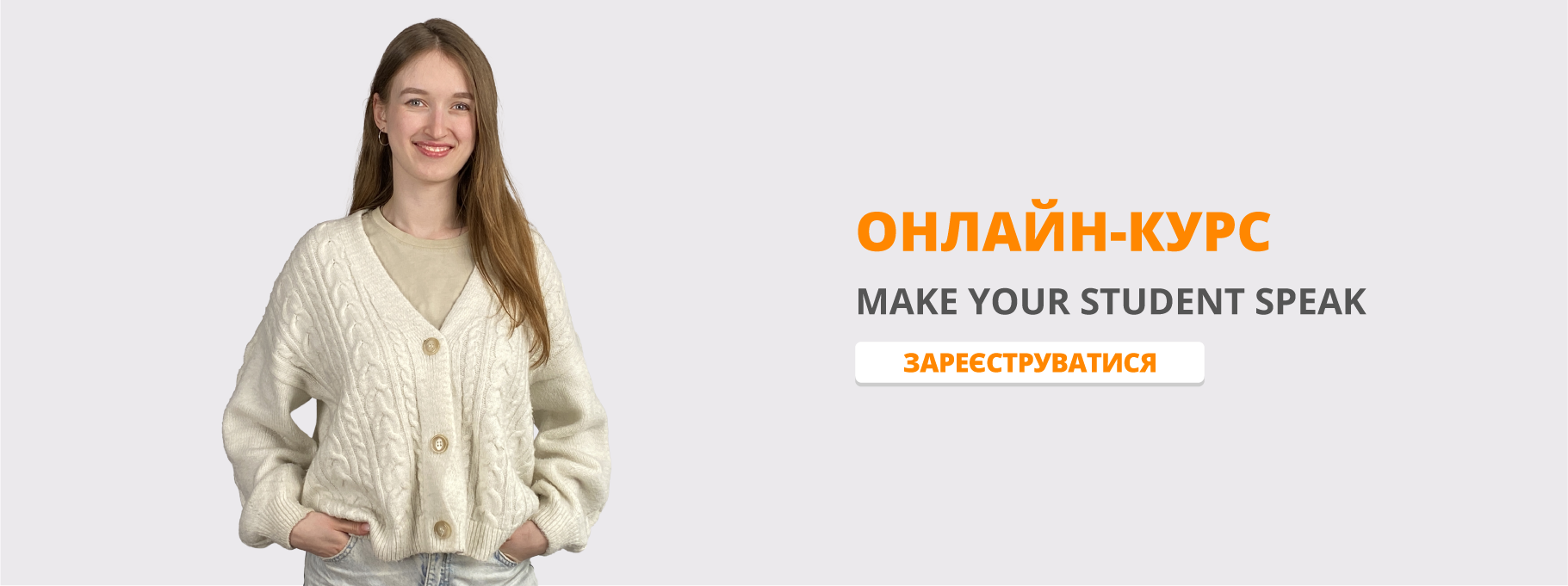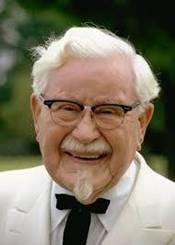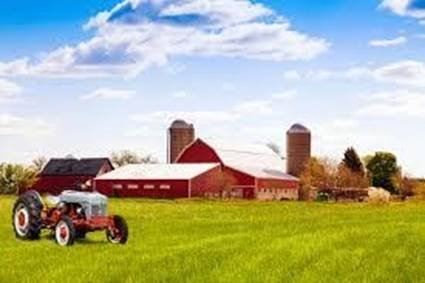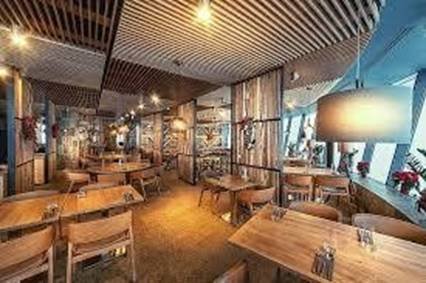Урок "Grammar+Speaking" (Past Simple), Part 2
LESSONPLAN
COVER PAGE
|
Lesson Focus: Grammar+Speaking |
Length: 45 min |
Level: Pre-intermediate |
|
Lesson Aim By the end of the lesson, students will be better able to use TL (question forms of the past simple in the context of stories or description of past events) and will have improved their speaking for fluency
Subsidiary Aim Practice affirmative and negative forms of the past simple Improve soft skills such as willingness to learn and effective communication
|
|
Materials
Handout 1 taken from Face2Face Student’s Book Pre-Intermediate, Chris Redston&Gillie Gunnigham, 2012, Cambridge University Press, p. 14; Handout 2, 3, 4 with created tasks.
|
|
Assumptions Students were present at the previous lesson and will be familiar with the text for reading The students will be familiar with the word order of Yes/No and WH- questions The students will know the Past Simple form of regular and irregular verbs |
|
White board plan: |
|
Stage 1
|
|
Stage 4
When did the first official KFC restaurant open? Wh- did+ subj + Verb
How old was Harland when he sold the company? Wh- was + subj
What happened in 1980? Wh- verb-ed
. wɒz . . ˈkʌmpəni
. . ˈ pəntɪn .
|
|
Time |
Interact ion |
Stage & Aim |
Procedure |
|
2 min
4 min
2 min |
T-Ss
S-S
T-Ss |
1 Lead-in To engage the students into the context of the lesson |
Show students the pictures of 4 places and ask them if they remember who the man in the picture is and how these places are connected to him. Elicit: “Harland Sanders is the creator of KFC.” “Harland’s mother went to work in a shirt factory.” “He left home when he was twelve and worked on a nearby farm.” “He became the manager of a service station in Corbin.” “He decided to move to a restaurant across the street where he could serve all his customers.”
Put students in pairs. Ask them to think about two places that played an important role in their lives and discuss these questions, set the time limit: “Think of two places or institutions that were important in your life, for example, a school, a sport club, a park etc. Why were they important? Talk to your partner for 3 minutes.”
Conduct an open class. Nominate students to answer. |
|
3 min
2 min
|
|
2 Reading To introduce the TL in the context. To provide practice in reading for detailed understanding
|
Chest Handout 1, set the task: “You are going to read a story of Harland Sanders again. Answer the questions a-f. You will have 3 minutes to work individually.”
Put students in pairs. Ask them to check in pairs. “Turn to your partner and talk about your answers. You have 2 minutes.” |
|
1 min |
|
|
Conduct an open class. |
|
3 min
2 min
1 min |
T-Ss
S
S-S
T-Ss |
3 Guided discovery clarification
To draw the students’ attention to the TL in the text and to focus on form
To clarify form of question form of past simple
|
Chest Handout 2, set the task: “Look at the questions a-f again. Match these questions with the scheme 1-3. Write the letter of the sentence in the correct line. You will have 2 minutes”
Ask students to pair-check. “In pairs compare your results. You have 2 minutes”
Conduct an open class. Ask students to unfold handouts and see the answers. |
|
4 min
|
T-Ss
|
4 Teacher-Led clarification To clarify form and phonology of question form of past simple
|
Elicit question form of past simple:
“When did the first official KFC restaurant open?” Wh- did+ subj + Verb
“How old was Harland when he sold the company?” Wh- was + subj
“What happened in 1980?” Wh- verb-ed
Check understanding by CCQs, “Do we use auxiliary verb in all questions?” – No |
|
|
|
|
“Do we use auxiliary in questions to ask about subject?” – No “Do we use auxiliary did with verb to be? – No “Where do we put the verb to be in a question?” – before the subject “What verb form do we use in questions with did? – the first or verb1 “Are questions with did same for all subject or different?” - same
Elicit and highlight features of phonology of sentences on the board in red. Model and drill pronunciation of the most challenging things.
/wɛn dɪd ə fɜːst əˈfɪʃəl keɪ-ɛf-siː ˈrɛstrɒnt ˈəʊpən/ /haʊ əʊld wɒz ha:lænd wɛn hiː səʊld ðə ˈkʌmpəni/ /wɒt ˈhæpənt ɪn 1980/ |
|
1 min
3 min
2 min
2 min |
T-Ss
S
S-S
T-Ss |
5 Controlled practice To practice accurate use of the TL, to focus on question form |
Chest Handout 3. Set the task: “Make questions in the past. Use the question word in brackets. Write the questions next to the sentences. You will have 3 minutes”
Ask students to pair-check. “In pairs compare your results. You have 2 minutes”
Give students Handout 4 with answers. Conduct and open class feedback. |
|
8 min
|
T-Ss
S-S
|
6 Freer practice To practice accurate use of the TL in a more personalized way. To practice speaking for fluency |
Chest Handout 4, put students in pairs, set the task: “Ask each other these questions and write the answer. You will have 4 minutes” Change pairs. Repeat the task. Monitor to collect material for DEC.
|
|
5 min min |
T-Ss |
|
Conduct and open class content feedback. Conduct delayed error correction. |
Handout 1 
Read the article again. Then answer these questions.
a. Why did Harland Sanders learn to cook?
b. How long did it take him to develop hoe secret recipe?
c. What happened in 1980?
d. How old was Harland sanders when he sold the company?
e. When did the first official KFC restaurant open?
f. Who bought KFC in 1986?
©.Taken from Face2Face Student’s Book Pre-Intermediate by Chris
Redston&Gillie Cunningham, 2012, Cambridge University Press, p.14
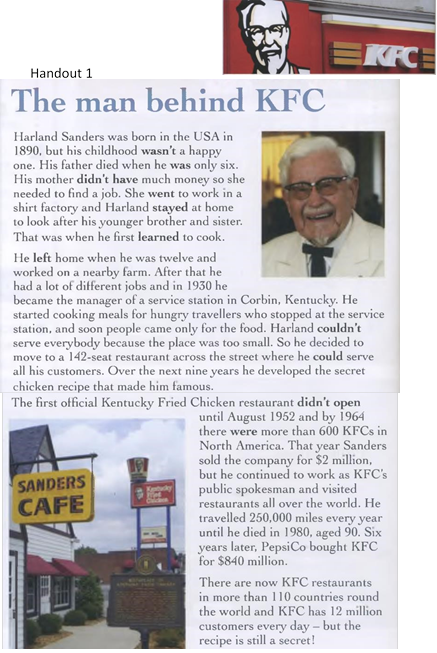
©.Taken from Face2Face Student’s Book Pre-Intermediate by Chris
Redston&Gillie Cunningham, 2012, Cambridge University Press, p.14
Handout 2
a. Why did Harland Sanders learn to cook?
b. How long did it take him to develop hoe secret recipe?
c. What happened in 1980?
d. How old was Harland sanders when he sold the company?
e. When did the first official KFC restaurant open?
f. Who bought KFC in 1986?
|
1.
|
Wh- was/were + subj
|
|
|
2. |
Wh- did + subj + Verb
|
|
|
3. |
Wh- verb-ed
|
|
Keys
|
1. |
Wh- did + subj + Verb
|
d |
|
2. |
Wh- was/were + subj
|
a b e |
|
3. |
Wh- verb-ed
|
c f |
©.Created by Iryna Prysiazhniuk
Handout 3
|
1 |
I lived in Lviv in 2017. (Where) |
|
|
2 |
I bought a new jacket last Friday. (What) |
|
|
3 |
I travelled to Madrid last year. (Where) |
|
|
4 |
I decided to study English. (Why)
|
|
|
5 |
I had a sandwich and black coffee for breakfast yesterday. (What) |
|
|
6 |
I learned to swim when I was 10. (When) |
|
|
7 |
I saw a great film last night. (What) |
|
|
8 |
I visited my old friend in London last weekend. (Who) |
|
|
9 |
I started to work for this company 5 years ago. (When) |
|
©.Created by Iryna Prysiazhniuk Handout 4
|
|
|
Your partner’s answers |
|
1 |
Where did you live in 2017? |
|
|
2 |
What did you buy last Friday? |
|
|
3 |
Where did you travel last year? |
|
|
4 |
Why did you decide to study English? |
|
|
5 |
What did you have for breakfast yesterday? |
|
|
6 |
When did you learn to swim? |
|
|
7 |
What (film) did you see last night? |
|
|
8 |
Who did you visit last weekend? |
|
|
9 |
When did you start to study at this school? |
|
©.Created by Iryna Prysiazhniuk
Handout 5
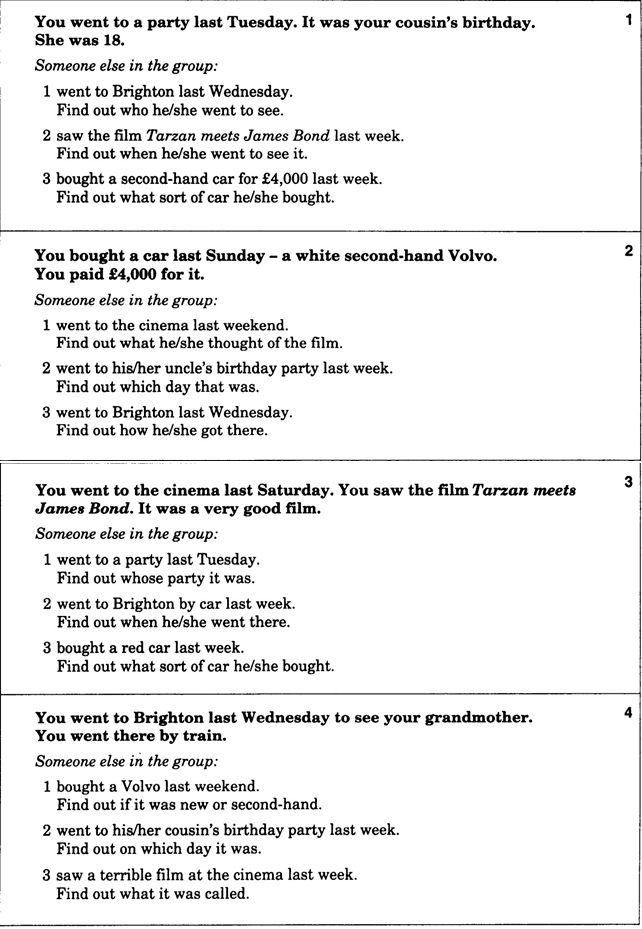
©.Taken from Grammar Games and Activities by Peter Watcyn, 1995,
Penguin Books, p.66-67
Handout 5
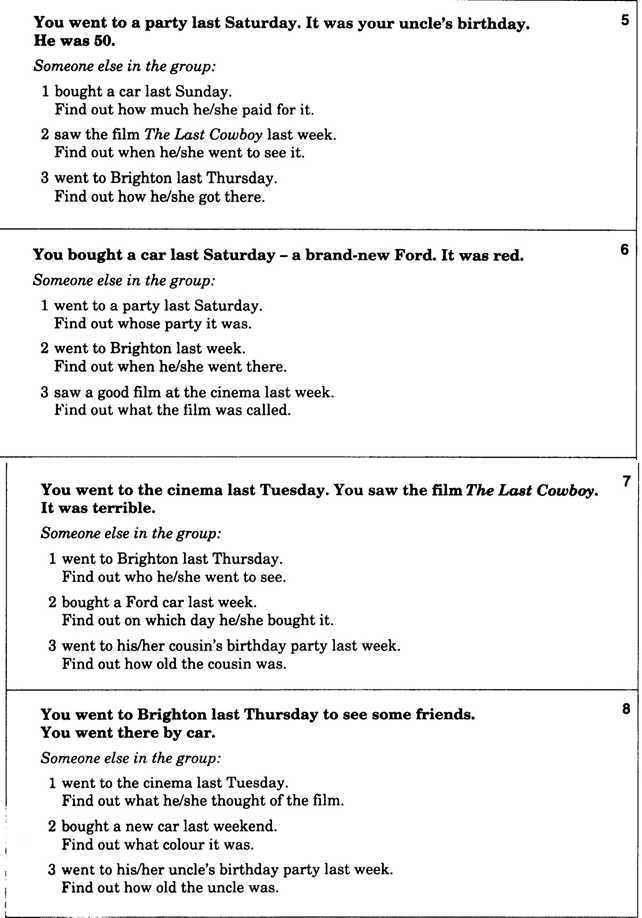
©.Taken from Grammar Games and Activities by Peter Watcyn, 1995,
Penguin Books, p.66-67
Handout 6
|
Student A |
|
1 |
2 |
|
3 |
|
|
|
What/Who |
Where/When |
|
Yes/No |
||
|
A |
eat out |
Q. |
|
Q. |
Q. |
|
|
A. |
|
A. |
A. |
|
||
|
B |
holiday |
Q. |
|
Q. |
Q. |
|
|
A. |
|
A. |
A. |
|
||
|
C |
film |
Q. |
|
Q. |
Q. |
|
|
A. |
|
A. |
A. |
|
||
|
D |
sports |
Q. |
|
Q. |
Q. |
|
|
A. |
|
A. |
A. |
|
||
©.Created by Iryna Prysiazhniuk Handout 6
|
Student B |
|
1 |
|
2 |
|
3 |
|
|
|
Where/When |
|
Yes/No |
|
Who/What |
||
|
A |
shopping
|
Q. |
|
Q. |
|
Q. |
|
|
A. |
|
A. |
|
A. |
|
||
|
B |
test
|
Q. |
|
Q. |
|
Q. |
|
|
A. |
|
A. |
|
A. |
|
||
|
C |
party
|
Q. |
|
Q. |
|
Q. |
|
|
A. |
|
A. |
|
A. |
|
||
|
D |
holiday |
Q. |
|
Q. |
|
Q. |
|
|
A. |
|
A. |
|
A. |
|
||
©.Created by Iryna Prysiazhniuk


про публікацію авторської розробки
Додати розробку
